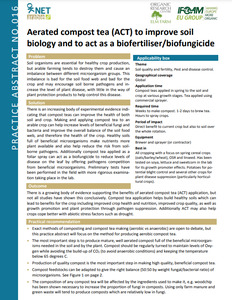{Tool} Aerated compost tea (ACT) to improve soil biology and to act as a biofertiliser/biofungicide (OK-Net Arable Practice Abstract). Creator(s): Amos, Dominic. Issuing Organisation(s): ORC - Organic Research Centre. OK-Net Arable Practice abstract, no. 016. (2017)
Preview |
PDF
- English
(Aerated compost tea (ACT) to improve soil biology and to act as a biofertiliser/biofungicide)
173kB |
![[thumbnail of 2022-10-04 15_25_27-Aerated compost tea (ACT) to improve soil biology and to act as a biofertiliser_.png]](/31042/7.hassmallThumbnailVersion/2022-10-04%2015_25_27-Aerated%20compost%20tea%20%28ACT%29%20to%20improve%20soil%20biology%20and%20to%20act%20as%20a%20biofertiliser_.png)  Preview |
Image (PNG)
- Cover Image
- English
126kB |
Document available online at: https://orgprints.org/31042/
Summary
There is a growing body of evidence supporting the benefits of aerated compost tea (ACT) application, but not all studies have shown this conclusively. Compost tea application helps build healthy soils which can lead to benefits for the crop including improved crop health and nutrition, improved crop quality, as well as growth promotion and plant protection through pathogen suppression. Additionally ACT may also help crops cope better with abiotic stress factors such as drought.
Practical recommendation
• Exact methods of composting and compost tea making (aerobic vs anaerobic) are open to debate, but this practice abstract will focus on the method for producing aerobic compost tea.
• The most important step is to produce mature, well aerated compost full of the beneficial microorganisms needed in the soil and by the plant. Compost should be regularly turned to maintain levels of Oxygen while avoiding the build-up of CO2 (to avoid anaerobic conditions) and keeping the temperature
below 65 degrees C.
• Production of quality compost is the most important step in making high quality, beneficial compost tea.
• Compost feedstocks can be adapted to give the right balance (50:50 by weight fungal/bacterial ratio) of microorganisms.
• The composition of any compost tea will be affected by the ingredients used to make it, e.g. woodchip has been shown necessary to increase the proportion of fungi in composts. Using only farm manure and green waste will tend to produce composts which are relatively low in fungi.
• Cereal crops benefit from a fungal dominant brew which can be created using certain feedstocks in the compost and by brewing the compost tea for a longer period of time (48 hrs).
• Oxygenate the compost in a brewer for 24 to 48 hrs. If using tap water, remove chlorine by aerating the water in the brewer for a few hours prior to adding compost. To stimulate microbial growth, molasses can be used or more complex additions can be bought that may contain among other things seaweed extract.
• Prior to spraying the compost tea must be filtered to remove any compost as this will cause blockages in the sprayer. Spray pressure should not exceed 2.5 bar (1-2 bar is preferable) and nozzle size should not be too fine as this will damage the delicate fungi in the brew. Spray volume should be around 250-300 l per ha.
• Soil drench post drilling application followed by 2 or 3 more applications, while the crop is still young (around 2-3 leaves), and at the highest disease pressure point (typically GS37 to 65 for cereals) is a good approach. On-farm demonstrations have involved a 3-spray-strategy in April, May and June after a March drilling of a spring cereal.
| EPrint Type: | Practice tool |
|---|---|
| What problem does the tool address?: | Soil organisms are essential for healthy crop production, but arable farming tends to destroy them and cause an imbalance between dif-ferent microorganism groups. This imbalance is bad for the soil food web and bad for the crop and may encourage soil borne pathogens and increase the level of plant disease, with little in the way of plant protection products to help control this disease. |
| What solution does the tool offer?: | There is an increasing body of experimental evidence indicating that compost teas can improve the health of both soil and crop. Making and applying compost tea to an arable crop can help increase levels of beneficial fungi and bacteria and improve the overall balance of the soil food web, and therefore the health of the crop. Healthy soils full of beneficial microorganisms make nutrients more plant available and also help reduce the risk from soil-borne pathogens. Additionally compost tea applied as a foliar spray can act as a biofungicide to reduce levels of disease on the leaf by offering pathogens competition from beneficial microorganisms. Preliminary tests have been performed in the field with more rigorous examination taking place in the lab. |
| Country: | United Kingdom of Great Britain and Northern Ireland |
| Type of Practice Tool: | Practice abstracts |
| Theme: | Soil quality and fertility, Pest and disease control |
| Keywords: | arable farming, compost, disease control, pest control, soil fertility, soil quality |
| Keywords: | arable farming, compost, plant disease control, pest control, soil fertility, soil quality, soil properties |
| Agrovoc keywords: | Language Value URI English arable farming http://aims.fao.org/aos/agrovoc/c_36528 English composts http://aims.fao.org/aos/agrovoc/c_1795 English plant disease control http://aims.fao.org/aos/agrovoc/c_5960 English pest control http://aims.fao.org/aos/agrovoc/c_5726 English soil fertility http://aims.fao.org/aos/agrovoc/c_7170 English soil quality http://aims.fao.org/aos/agrovoc/c_a9645d28 |
| Subjects: | Soil > Soil quality Soil Crop husbandry > Crop health, quality, protection |
| Research affiliation: | European Union > Horizon 2020 > OK-Net Arable > OK-Net-Arable Tools European Union > Horizon 2020 > OK-Net Arable UK > Organic Research Centre (ORC) |
| Horizon Europe or H2020 Grant Agreement Number: | 652654 |
| Related Links: | https://organic-farmknowledge.org/tool/31042 |
| Project ID: | ofk |
| Deposited By: | Forschungsinstitut für biologischen Landbau, FiBL |
| ID Code: | 31042 |
| Deposited On: | 18 Jan 2017 15:02 |
| Last Modified: | 04 Oct 2022 13:29 |
| Document Language: | English |
| Status: | Published |
Repository Staff Only: item control page

 Download Statistics
Download Statistics Download Statistics
Download Statistics
